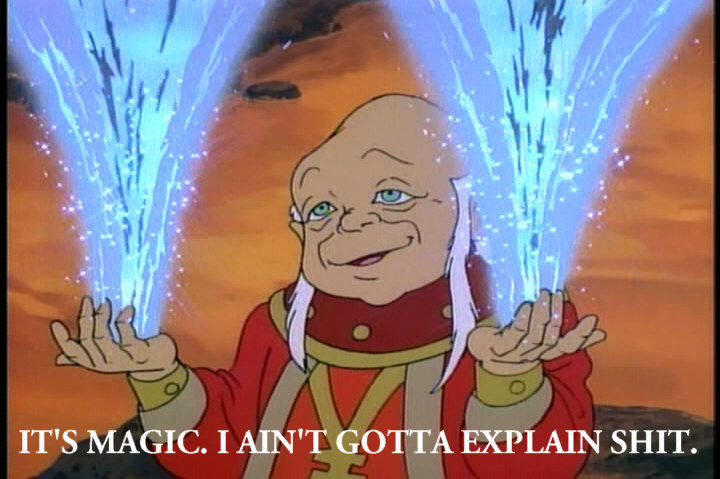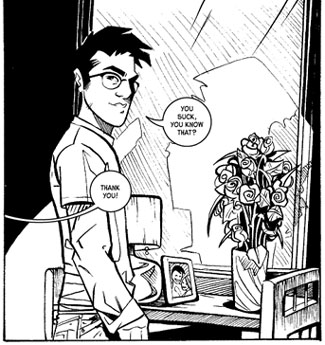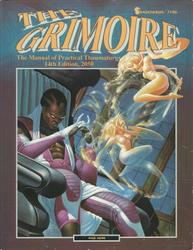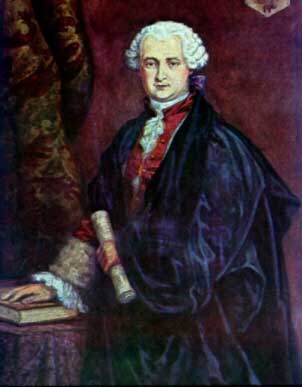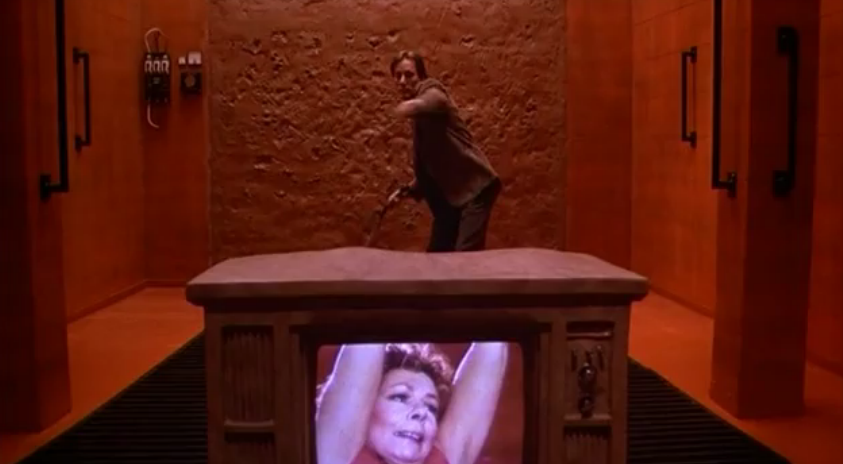Book Two: Part Two:
The World of Our Desires

Our musical accompaniment today will be
The Wizard. We could have linked the Daffy Duck version, but we did not.
FrankT:
These two chapters are more than a quarter of the book. They are more than half of the book that anyone gives a fuck about. When one of your friends rants at you about how cool Unknown Armies is, he's almost certainly talking about something in this section. Which makes their decision to tell new players to
not read it all the more puzzling. To the extent that Unknown Armies has hooks, these are them. You'd think they'd want to lead with their best foot, but apparently they don't.
 Long Chapter is Long.
Long Chapter is Long.
Honestly, it gives the whole thing a sort of mystery cult feel. Someone who is going to gamemaster is supposed to read the whole book, and that's where “the good stuff” is. The rest of the players are just supposed to read the part that contains some dude's half-assed Call of Cthulhu house rules. The disparity of information probably helps to make the one guy who has read the book feel even cooler about everything, but honestly I've never heard of anyone having a successful long campaign of this game, and the disparity of information probably helps make the other players feel even more shat on.
AncientH:
There was this guy who was crazy: speaking in other voices crazy, bad trouble crazy. Yet he kept it together enough to have a girlfriend, and one day when his facade of sanity crumbled and she asked him the obvious question: "Have you thought about getting professional help?" He said the first fearful thing that came into his crazymaking head: "But what if I come out a happy, well-rounded person?"
Welcome to the world of the adept.
Part of the appeal of Unknown Armies is that it eschews a lot of the conventions of RPGs up to that point. Wizards aren't generic. There are references to existing magical traditions, sure, but the setting isn't based on it, nor does it bring forward a lot of new gods and shit to memorize. Boil away the thin veneer of dukes and cabals and shit and what Unknown Armies sells you is an attitude and a handful of ideas, and in the rather staid atmosphere of most RPGs, that'll carry you a long, long way.
Chapter Ten: Adepts

AncientH:
The whole world is waiting for you and they don't even know it.
The thing about any sort of underground is that it tends to be a relatively small, intimate thing - the people in it might hate each other, but they also know each other, and the occult underground of Unknown Armies is small enough that the player characters should have impact just by being there...a trenchcoat brigade standing alone against the forces of night. In practice, well, maybe not. But it's the first idea they sell you on.

Adepts are, arguably, the big push in the book. The idea is that you have a
school of whatever-mancy, it's an obsession with something that has so twisted your worldview that reality itself breaks down and starts conforming to some of your batshit insanity. Which is really a sweet place to be, because you get to turn your mental illness into a path to power. Unknown Armies doesn't give
a reason for this, it gives you a couple-three theories and a few magickal laws ("Law of Symbolic Tension," "Law of Transaction," and "Law of Obedience") - which boils down to:
1) Magick doesn't make sense.
2) Magick has a price.
3) You only get one school of magick.

#1 is the hardest for everybody to come to grips with, because it's the "1 + 1 = purple" problem. It's someone finding cosmic enlightenment in the patterns of a doily or making a pact with Satan by listening to heavy metal records backwards and having a conversation with the voices there. More specifically, every school of magic is supposed to have an inherent paradox built into it - like the pornomancer that can't have meaningful sex. It's a weird idea to get your head around, and there's never a
why to it, and the supplements with new schools never quite huffed the same gas fumes, if you catch my drifts.
#2 and #3 are, by contrast, pretty easy to understand. Magic requires sacrifice (soul, sanity, charges, hell even Visa cards), and you're a munchkinny fuck if you want to have more than one adept school.
FrankT:
This game has 12 magical traditions and this chapter spends 47 pages explaining them. The other 12 pages of the chapter are given over to magic rules. You'd think that magic rules would have gone in the previous chapter, and when you come across crap like “The Laws of Magick” then that thought narrows to simple certainty. Organizationally, it simply would have been better if the Adepts chapter had been basically just a page on how to read the entries of the magical traditions and then the magical traditions, with all the general magic rules in the god damn chapter that supposedly has the fucking general magic rules in it.
 Despite the gonzo deliveries, magic in this setting is pretty much Crowleyist will working and/or early eighties Chaos Magick.
Despite the gonzo deliveries, magic in this setting is pretty much Crowleyist will working and/or early eighties Chaos Magick.
The actual Laws of Magick themselves are basically simple game mechanics drawn up with fancy looking rants. You aren't allowed to pick multiple magic paths because game balance, and you aren't allowed to cast bigger spells than you can afford because game balance. But this is conveyed in tortuous prose as “The Law of Obedience” and “The Law of Transaction.”
AncientH:
Nominally these "laws" only apply to adepts, so I can sort of see why they included them here...sortof.
Anyway, where thaumaturges get rituals, adepts get spells. Spells are functionally almost identical to Sphere magic in the Mage games, except instead of having spheres you just describe the effect, Mister Cavern picks a charge cost and any shift for your roll, and then you roll to see if you can cast it. Spells came in three flavors: blast, formula (similar to Mage rotes or rituals), and random (improvised spells). Improvised spells are basically Rule Zero written several times in large letters: Mister Cavern decides what you can do and what it costs, no argument.

FrankT:
Much is made over “blasts,” which are the default magickal attack. And by much being made, I mean that the rules go on for quite some time and I don't know how they work. Magic blast attacks use their own bizarre dice mechanic where you can take penalties to your skill to roll extra dice and then pick and choose which die you want to be the tens place. This is annoying on several levels. Firstly, because it's simply a solvable problem how many dice you want to buy, and then that's the number of dice you roll every time you use your blast. The designers have to know this, because they gave a little chart for effective skill ratings with obsession skills earlier in the book, but they don't provide a helpful little chart here – the players are just supposed to play accountants and dragons for a while before the game starts. A 40 with 2 dice is “effectively” a 63, a 30 with 3 dice is “effectively” a 66, and so on. It's painful combinatorials, but it's not actually
hard and there's no part of it that is dynamic or interesting during the game.
But it's no less irritating in that this is page 114 and they are telling you that you might need five or six dice. The beginning of the book said you needed
two dice. Five or six is more than two, and I think it is plain dirty pool to contradict the “what you need to play” in an aside when the book is one third over.
 Once you've math hammered the combinatorials, you can figure out what you're actually supposed to roll when you use your blast attacks.
Once you've math hammered the combinatorials, you can figure out what you're actually supposed to roll when you use your blast attacks.
But as we get into the actual traditions, it becomes clear that I
really don't know how this fucking system is supposed to work. The money mages have their blast being themed as forcing enemies to hurt themselves, with examples of shooting themselves or putting their face through a TV. Does that do normal blast damage or does it do damage based on the self harm it motivates? Does it take place on the adept's turn or the target's? Does it use up the target's next action? I don't fucking know. These rules don't fucking say. It's all secrets and poetry and basic things like “how much time does this take?” aren't handled well if they are referenced at all.
AncientH:
Now, you
can actually become an adept during play; there's a section on self-taught adepts and mentored adepts. It basically requires you to fail several sanity tests until you become permanently nuts in the "Self" sanity track; you gain a pittance of Magick skill and a school. Congratulations, here's your meds. After breaking you down to the point where magic seems plausible, you or your mentor then build you back up to the point of a near-functioning human being, get issued your tinfoil hat, and are shoved out into the world.
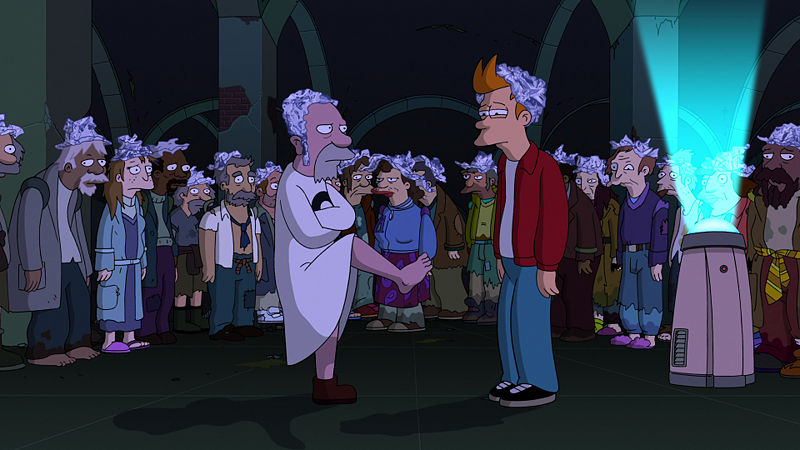 Contrary to this image, there are expressly no organizations among "schools." There isn't an invisible college of pornomancers where you go to learn pornomancy or anything, and people of the same school expressly don't get along with each other because minor differences in understanding of their schools turn into huge sectarian conflicts.
Contrary to this image, there are expressly no organizations among "schools." There isn't an invisible college of pornomancers where you go to learn pornomancy or anything, and people of the same school expressly don't get along with each other because minor differences in understanding of their schools turn into huge sectarian conflicts.
Magick is always an Obsession skill for adepts (it replaces your old Obsession skill), so you get "cherries" - little bonuses (when they're positive) that can affect you.
FrankT:
The actual mechanics for using magick (with a
K) are generally that you make a skill check. Each magical tradition has its own skill, and each person is allowed exactly one magical tradition. Also, you're allowed one
obsession skill, but your magical skill is literally required to be your obsession skill. So while the different magical traditions are all wildly different in some ways, all the
characters are pretty much exactly the same. You have a “goodness” skill that determines how good you are at pretty much everything, and you max out that skill because you're not a fucking idiot. So while one player will have “videomancy” written on their sheet and another player will have “entropomancy” written on their sheet, these two skills are used in pretty much exactly the same way and are statistically likely to be literally exactly the same number.
 Unknown Armies introduces complication for complication's sake rather often.
Unknown Armies introduces complication for complication's sake rather often.
Note that also since the skill lists are fucking secret to new players and there is absolutely no way in fucking hell that you were ever going to guess that “Epideromancy” was a skill that you should write on your character sheet, that new players are going to necessarily start with a big
zero in whatever magical skill they ever unlock. So they are never ever going to ever amount to anything magically. Meaning that the whole promise of Scoobies uncovering magical secrets and joining the occult underground that was made back in Book One is a fucking lie.
AncientH:
Keep in mind that you have limited points in the beginning, and thaumaturgy, adept Magick, and avatar Magick all require their own skillz. So if you do want to be a big-time wizard, you're trying to max out three skills, minimum, just to not suck too badly.
FrankT:
There are twelve magic paths, and each one gets about four pages. Not necessarily exactly four pages, some get more or less. Cliomancy gets five and Entropomancy only 3. But four is what you get most of the time. This is both too much and too little. It's a
massive infodump. The twelve magical traditions are basically a seventh of the entire book and constitute more pagespace than the actual rules of the game that new players are allowed to read. But you really don't get that much
meat on any of these guys. Each type of Adept gets six minor spells and seven significant spells. And while that's each almost as big as the whole spell list in the Magick chapter, it's still
smaller. Each Adept type only has 13 spells, it only takes up so much page space because the prose is... not spare. It takes six fucking paragraphs to explain the spell that impoverishes someone by making them lose twice as much money every day until they have no dollars in their bank account.

This underlies the primary contradiction of this book. Unknown Armies sells itself on flavor, but it doesn't ever tell you enough about anything to go anywhere with it. It's fun to
read about Plutomancy, but there isn't really enough Plutomantic magic to tell cooperative stories about it. You'd definitely have to make up new spells if you wanted to really have an RPG. The rules for making your own spells really come down to “fucking make something up,” the guidelines just aren't there in a usefully usable form.
AncientH:
I'm not convinced there was one person writing all of the adept school entries. Each one is so fucking different, I'm pretty sure that Tines and Stolze split the difference, and maybe drunk-wrestled for a couple. Nominally what you're supposed to look at and care about from a game-system perspective are the "Stats" for the school - a listing of what you need to do to generate a minor, significant, and major charge; a taboo; an idea of what their random magic covers; how many starting charges they get; and some "tips" which are a rough guidelines for how to get charges/how many charges the MC should award the studious PC.
But that's only a fraction of the total entry for each school. There are specific concerns for each school, blast style, a bunch of formula spells, and a rumor section that's maybe supposed to be an adventure hook but more often than not is weird magick wanck.
FrankT:
The schools of magic are nothing like balanced. They aren't even a little bit balanced if you look at them in a bad light. There are clear winners and losers. The basic effects of spellcasting is thirteen completely arbitrary
spells for each school, most of which are terrible wastes of time but some of which are very powerful. Also, each type of Adept has a writeup for the blast, although as mentioned earlier in some cases the description of the blast sounds like it has different rules than the normal ones, but that's never explicitly stated. Personamancers don't get a blast at all. The basic currencies of spellcasting are various levels of “charges,” and each tradition of magic does different shit to get their charges. The shit you have to do varies wildly in difficulty and repeatability. It's not just that specifically some groups can use Thaumaturgy to power up charges and others can't because go fuck yourself – it's that some require you to work for hours and others let pick up multiple charges in minutes. If a plutomancer works the cash register at a Safeway or Frys, he basically gets a charge every time he rings up a customer, while the aforementioned Personamancer gets one charge for every hour she spends in full stage makeup delivering monologues in a funny voice. As a pornomancer you need to perform a ritual sex act based on a mid-nineties porn series to get a single charge.
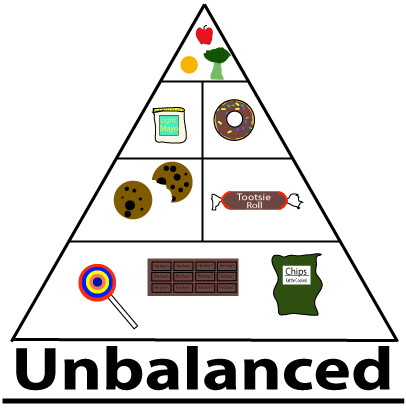
The different types of characters also get different amounts of starting charges at the beginning of the game. But based on how easy or difficult it is to get new charges, this doesn't even pretend to make any fucking difference.
AncientH:
We're not going to get to every school, so I'll just hit some quick rundowns:
Bibliomancers are book lovers who get off of collecting and owning books, but not necessarily reading them - just the physical ownership of the book, the quality and rarity and the edition. Most bibliomancers specialized in a specific type of book, like Bibles or Oprah's Book Club editions or comics or something, and their magical power is literally tied to how many books they physically own - and they can never loan or sell them, unless it's to get a better book. Minor and significant charges just require money (at about $100 per minor charge) and diligent searching; acquiring a major charge requires getting a unique book like the
Necronomicon or the gold discs of Mormon or something.
Cliomancers are the masters of Trivial Pursuit; their magic specializes in "general knowledge" that "everybody knows," and they get charges off of visiting famous landmarks that are widely known by many people. They don't have a blast, and while you can harvest minor or significant charges just by doing a walking tour of Washington D.C. or London, to harvest a major charge you need to be the first cliomancer to visit some famous place in ten years. On the flip side, your charges only last a month and fade away if not used.
Cliomancy also has some bullshit about immortal Atlanteans that makes me angry.
Dipsomancers are alcoholics, for whom blood alcohol level equals power. To do magick, they have to be totally smashed, and will spend a minimum of three hours per day on the toilet, lose friends and family, have trouble hanging onto a job, and probably die of cirrhosis of the liver. Minor charges come from taking a drink and getting tipsy; significant charges come from drinking from a historically potent or significant vessel; major charges come from drinking a unique liquor of some kind. If you sober up, you lose all your charges.
Dipsomancers are one of the most-remembered schools in the game, one of the famous ones. It lets you get magical power by turning your enemy's skull into a chalice and drinking whisky out of their brain pan, and their greatest formula spells let you literally bottle up a demon or ghost and drain their knowledge and power sip by sip.
FrankT:
Every type of magician has an annoying taboo – a thing that if they do they lose all their magic and have to start over from zero. Since some characters can generate dozens or hundreds of charges in a day and others can't, this may or may not make any difference. The taboos are in many cases totally fucked: pornomancers aren't allowed to have non-ritual sex, thus making their presumed character concept unworkable. Other taboos are totally gamable – the plutomancer loses his unspent charges if he spends more than $1000 on a single bill, but there's nothing preventing him from setting up installment plans to pay for his mansion in weekly or even daily payments and never even fucking notice that he has nominal limits on spending.

Each one is supposed to be an ironic paradox, but it's not so much ironic as stupid in most cases. I don't want to play a Narco-Alchemist who isn't allowed to take LSD. And yet, I actually don't give a single fuck if my skin mage is required to cut her own hair.
AncientH:
Entropomancers get their power by playing Russian roulette and win. They gain charges by surrendering themselves to chance, be it gambling with money (minor), serious injury or death (significant), or the lives of you and everyone nearby (major). In exchange, you get coincidence magic: always a cop when you need one, desperate for a shag and the hottie at the bar is on the rebound from a nasty divorce, bank error in your favor, etc.
 Chev Chelios: Legendary Entropmancer
Epideromancers
Chev Chelios: Legendary Entropmancer
Epideromancers are cutters. They gain power by hurting themselves. The more they bleed, the more juice they get. Major charges require some Odin-level shit like plucking out an eye or cutting off a hand. On the other hand, if you let anyone else modify your body - tattoos, dentistry, haircut, proctology exam - you lose all your charges. Also, you can't use magick to heal your epideromancy cuts. You
can use your magick to alter flesh though. Not quite Vicissitude style, but close!
 I never liked those nipples anyway.
I never liked those nipples anyway.
Mechanomancers use clockwork to work miracles. The paradox is that it used to be bleeding edge, and now it's a relic. This was before steampunk or etsy was a thing. Mechanomancers get charges from working on their gears (minor), giving up a minor memory from their past
or acquiring a significant historical object (significant), and to give up a major memory
or get a complete, working, historically significant piece of machinery (major). But they can't incorporate any tech into their clockworks from after about 1800, and you can only build magic into your hand-built mechanical machines.
Which means yes, you could potentially get a little factory going of mechanomancers each doing their clockwork bit, if you could get them in a room together without killing each other, and yes they're going to be on eBay like the bibliomancers putting money against fantastic watches and Swiss cuckoo clocks and shit. But if they put some gears on your iphone, they lose all their mojo.
FrankT:
The twelve magical traditions are bizarrely aggressively specific. Yet at the same time they are too sketchily described to really do anything with. Pornomancers aren't sex magicians
in general, they are the followers of a specific sex cult based on re-enacting the works of a specific divinely ascended mid-nineties porn star. Honestly, it's difficult for me to imagine caring about the Naked Goddess. She gets
mentioned a lot, but she doesn't get
described at all. So I don't
care. If sex magic has to follow the script of a specific series of porn films, shouldn't we at least get told what
kind of porn they were? It was the mid-nineties, so
I assume she had big hair and a trimmed but unshaved pubic region, but was she pretending to be a lonely housewife? A naughty school girl? A saucy flight attendant? Are these movies straight sex? Group sex? Softcore only? BDSM? 2G1C? What? Are pornomancers required or prevented from taking it in the butt? We don't fucking know the answer to any of this shit.

By making pornomancy into a specific filmography based on a specific fictional actress, players of pornomancers are then required to use the specific costumes and sexual assortments of that specific actress. But that information doesn't fucking exist. And while you could say that leaving the sex recipes unwritten is an insurance policy against players being forced to have their characters perform sex acts they aren't comfortable with, that's actually bullshit. First of all, one of the things you're supposed to do is discover sex acts of the Naked Goddess back when she was a mortal and then perform them – that's how you do the big hoodoo magic. Which means that the actual dynamic is that the MC pops sex acts on you in the middle of the game and then your character has to do them. That has the huge potential to be creepy as hell, especially when you discover that the gamemaster is a looner or rape fetishist or some fucking thing. Secondly, one of the suggested global campaigns is for
everyone to be a pornomancer, which requires each person at the table to have the same list of allowed sex acts. Again, that's pretty much a recipe to push peoples' boundaries into unhappy territory. Just because you're OK with another player having
their character go ass to mouth doesn't mean you're OK with having
your character doing that.
It's just puzzling. People like sex magick. Sex magick is fun. It's sexy. It has sex
in the name. But then this book had to go make it all weird. It's almost a complete list of things to
not do if you want to have sex magick in your game.
Don't bring sex acts into the game without other people being comfortable with them.
Don't force your fetishes on the other players.
Don't restrict other players from having their fetishes. Just don't do that kind of crap. This book does it all. This is the worst sex magick writeup I've ever seen,
FATAL included. Because at least in FATAL it's
supposed to be an overlong dead baby joke and being offensive and stupid is kind of the point. Here, you're supposed to play it serious and then have it sprung on you in the middle of the damn game that you're supposed to re-enact the time your idol was molested by her uncle or something and then everything dissolves into uncomfortable acrimony.
AncientH:
Narco-Alchemists read
Cannabis Alchemy a bit too strongly. Narco-Alchemists are a lot like dipsomancers in that they're addict-magicians; where the dispomancers need to be shitfaced, the narco-alchemists require serious brainbending drugs. They get fucked up to perfect their spirits. "Minor narquis" draw the line at that - they're users who get magical charges off of doing hard drugs; "significant narquis" actually brew their own drugs. It's the difference between being a meth addict, and being a meth addict who owns his own meth lab...and who gains permanent superpowers from the supermeth he brews.
There are a few drawbacks: no way to generate a major charge, no blasts, and the "works" that significant narquis generate in the hopes of creating a significant charge are still really gonzo "I'm off my tits" drugs. Significant narquis lose all charges and powers if they ever use street drugs instead of their own home-brewed magic crack.
Personamancers put on a mask, pretending to be something or someone they're not. At first because it was easier, or it was expected of them, but then because they found out that it gave them magic. All they had to do was never really be themselves. They gain charges by acting in front of an audience (minor), pretending to be somebody else for a day (significant), or fooling an audience of ten million people or more (major). Their magick affects identity, which is subtle but scary: they could take a dispomancer and make them no longer be an alcoholic. No blast. Lose charges if you show any of your Passions in front of someone else.
Plutomancers gain magic by gaining money. The paradox is that if they spend money, they lose magic. So these are the millionaires that lie about their age to get a discount ticket at the theater, or hoarders with ten million dollars in gold coins under their bed but eat ramen like college students and steal condiments from fast food places. To gain charges, you need someone to give you money as a lump sum: $100 (minor), $1000 (significant), $100 million (major). Stealing doesn't count, but getting a reward or fencing the loot would. Spending more than $1000 as a lump sum and you lose all your charges. Plutomancy is good for getting what you want; it can be used to call physical items towards you.
Frank's covered Pornomancers in sufficient detail, I think.
Urbanomancers are city magicians; they love the city, but the city doesn't give a shit about them. Minor charges come from studying the city, significant charges come from interfering with the city significantly, major charges come from permanently altering the city somehow. Urbanomancers lose charges if they ever touch the dirt on which a city is built, and their magick fails outside the city limits.
Basically, this is one part
megapolisomancy and one part Jack Hawksmoor.
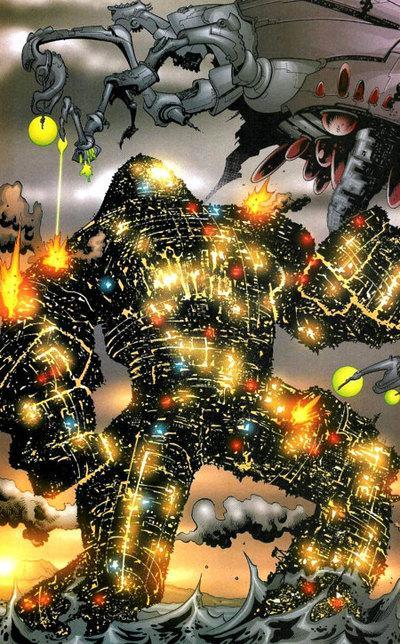 Tokyo is just a giant battlesuit we haven't learned how to use yet.
Videomancers
Tokyo is just a giant battlesuit we haven't learned how to use yet.
Videomancers get power from the TV, connecting with millions of people through the shared medium of television...however, you do this by being slave to the TV, unable to interact with people in any way. Oh, wait, the internet. Shut the fuck up! Anyway, videomancers charge up by watching their favorite programs and lose charges when they miss them (wait, what about TiVo? Shut the FUCK up, I said.) Minor charges come from reruns, significant charges from watching new episodes (nightly news count as new episodes), major charges come from starring in an episode of your favorite program. Reruns count for missed charges, so Nick At Night probably screwed a lot of Videomancers over; no word on streaming TV.
The chapter ends with some miscellaneous rules on creating new formula spells and customizing old schools of magick.
Things they don't
really address are "What the fuck do you do as an adept, aside from generate and spend charges?" or "How the fuck are adepts supposed to work together in cabals?"
Chapter Eleven: Avatars
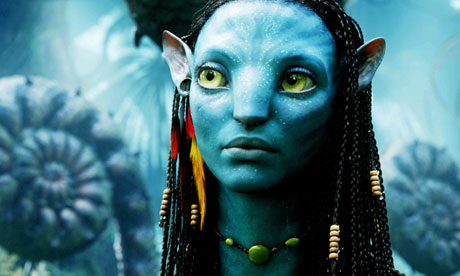 No.
No.
 Not exactly...
Not exactly...
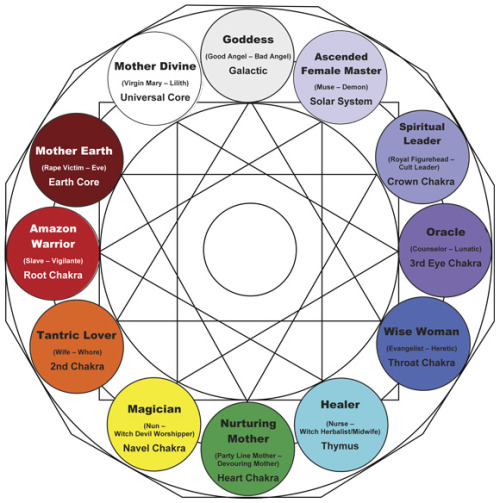 There we go.
There we go.
FrankT:
Avatar magick is when you re-enact the life and times of a Jungian archetype so hard that you get magical powers. You may ask how exactly this is different from the pornomancers that I was ranting about last chapter who spend their times re-enacting the stuff that The Goddess did in order to get magical powers. And um... hmmm... it's kind of not. But Avatar Magick is in the Avatars chapter and the Adepts who basically do that are in the Adepts chapter. Because fuck you, that's why.
AncientH:
Pornomancers are supposed to have some inherent paradox to their shit - they have sex to gain power, but not for pleasure; Plutocrats earn money to gain power, but not to spend it; Bibliomancers get books to own the books, not to read them, etc. The thing about the avatars is that you follow the archetypes (or one of their major incarnations, like Captain Kirk as the Pilgrim); ideally you move from mimicking someone else to becoming the incarnation of it, from quoting badasses to being a badass.
FrankT:
There are fourteen Avatar examples in this chapter. That's more than the twelve adept paths, but it all squeezes into 30 pages because each Avatar archetype only gets a single page and there is a lot of art. Some of the archetypes seem properly, well,
archetypical. Like “The Fool” or “The Warrior.” Others are shit like “The Flying Woman” and “The Mystic Hermaphrodite” that probably should have been left on the cutting room floor to make room for more iconic icons.
 Only a few of the archetypes presented are as iconic as this.
Only a few of the archetypes presented are as iconic as this.
AncientH:
Avatars have an Avatar skill, and the percentile in the Avatar skill determines what shit you can do, which are called
channels. You don't fuck around with charges, but you have adept-style taboos and a bunch of suggested filler material for playing your avatar. Channels come in skill levels of 1-50%, 51-70%, 71-90%, and 91+%. Which means that at the low level, Avatars can do jack shit and have very little chance of even accomplishing that, and at (theoretical) high levels they can do some very impressive shit and are almost guaranteed to succeed. If you minmax at game start, you're in the middle tier, with a slightly better than 50% chance to do some moderate effect.
FrankT:
You can start as an Avatar, or you can try to acquire Avatarhood during play. Getting it during play takes 15 weeks and gives you an Avatar skill of 11 which you can then raise normally with experience. So that just isn't going to fucking happen and it's kind of insulting for the book to even pretend to give you this as an option.
Fundamentally the authors don't seem to understand how
fucked people are if they try to buy up skills from zero during play. Over and over again the game gives you the option of buying into new powers by purchasing new skills from a cold start. And this just doesn't work at all. I don't even understand how this could be a second edition.
AncientH:
While adepts get random magic and specific formulaic effects, Avatar channels tend to be much more broad and ill-defined. For example, at 71-90% a Demagogue can start influencing belief systems in mass consciousness - she decides Hemingway was homosexual, then suddenly grad students around the world start writing term papers on it, as if the same idea had occurred to all of them concurrently.
...which is rife for abuse, if you're a certain type of player. I'd try to come up with an idea where all the other Demagogues got the idea to get people to send me money, and then fuck off and go live like a king in Patagonia before you could say "No backsies!" Of course, this is one of those powers which only guarantee an
effect, not an
outcome. So the idea might be out there, but if it's too silly then no-one will act on it...or maybe a little old lady in Fuckitall, Idaho will mail you her life savings and die in poverty. Depends on how much the gamemaster has had to drink.
So, to finish this chapter up, a quick run-down of the avatars, taboos, and powers.
The Demagogue. Cannot admit they're wrong.
Ever. Can adjust the world-view of other people. Indistinguishable from skilled lying.
The Executioner. Kills people, but cannot decide who to kill - always has to have someone else tell them to kill someone before they can do it. Lets you get very good at killing people.
The Flying Woman. Females only; doesn't ask permission and doesn't give a fuck about your opinion. Succeeds against any power that would hold her back or keep her down - including fucking gravity.
The Fool. Mind cannot go above 50, and cannot act suspicious of anyone. Gains synchronicity: the world seems to shape itself so stuff turns out as you need it to be. Always have the exact change for pizza, always Peso Pussy Night when you need to get laid, etc.
The Masterless Man. Guys only; cannot have a master, can't stay in the same place for long or own more shit than you can pack up within 12 hours. Gain combat bonuses.
The Merchant. Never gives anything away ("Damn shame about Christmas"), cannot get the worse of any deal. Can call up demons to make deals with them, and at high levels people have to pay you to hurt you.
The Messenger. Cannot deny the truth. In exchange, gets the ability to deliver messages with fewer obstacles, tell the truth convincingly, some vague divination abilities, and the ability to show up somewhere important. Maddeningly vague.
The Mother. Cannot harm a child, or let a child be harmed by inaction. This is pretty vague, since a mother could kill a child to prevent it from being "corrupted." Gains powers to protect/heal children, and at highest level cannot be killed in presence of an endangered child.
The MVP. Cannot showboat, or be publicly proven to have cheated, broken the law, or otherwise tarnish their image. In exchange, draws power from fans to excel at his sport, and at higher levels gives back, his wins translating directly to improvement in fans' lives.
The Mystic Hermaphrodite. Cannot be unambiguous about anything other than dedication to the Avatar path; this is sort of like the version of True Neutral where for every good deed you have to do a balancing evil deed. In exchange you can sense gender identity, when people gain charges nearby, change your biological gender (with a small chance of becoming a functional hermaphrodite), and gain a charge from changing genders and spend them to do random shit.
The Pilgrim. Can only go towards a single goal, and cannot dawdle along the way. In exchange, you have an easier time doing shit, especially long journeys, re-route doors as if they were portals, and can also curse someone to be perpetually trapped in your closet.
 That fucker, right there. Can reset any doors you open to his closet. You open the door, you step into his closet. You open the closet door, you step into...his closet.
The Savage.
That fucker, right there. Can reset any doors you open to his closet. You open the door, you step into his closet. You open the closet door, you step into...his closet.
The Savage. Unable to be deceitful using language, uncomfortable using, building, or repairing machines. Including driving cars. In exchange, you get a body like Brad Pitt, can use your Avatar skill for Tarzan-like antics, talk to animals, and are harder to kill with guns or magic.
The True King. Must have a Realm (land and/or followers) they protect and take responsibility for. So you can be King of 7th Street, King of the Cops, King of the 7th Street Cops, etc. Realm and King are linked, and both can serve and protect the other.
The Warrior. Has to choose some concept or thing they are against - women, sex before marriage, Serbians, drugs, illiteracy, etc. - that they cannot compromise with under any circumstances. In exchange, gains bonuses when pursuing his war against his chosen enemy; one of the examples given was for an Al Quaeda Warrior, which seems in poor taste in 2002.
And that's the chapter. As you can see, the avatars are simpler than the adepts, but no less bugfuck insane. The real fun, of course, comes from
mixing the two, since a lot of these aren't technically or mechanically incompatible, only brain-meltingly ideologically incompatible. For example, I had my main villain in my short-lived Unknown Armies campaign as a Bibliomancer/True King - he was the superintendent of the public library system, which constituted his Realm, and all the books were technically his - and since he owned them, he didn't lose charges from loaning them out. But he got
proper pissed when people stole or didn't return their library books.
Avatars and adepts are such a weird mix of stuff that even the book brings it up like there's only one or two here and there - the most famous one is The Freak, an Epidermomancer/Mystic Hermaphrodite that's heavily into body modification and masochism. There's probably more than a few insane ways to game the system using avatar/adept combos, but to do it proper requires a lot more patience in gaming than I've ever managed.
Next up: Book 3, part one![/img]










